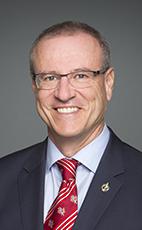Mr. Chair, I will be sharing my time with the hon. member for Mount Royal.
The present day hell of Darfur has its roots in the competition for scarce resources in the region. African farmers and nomadic Arab herders have been vying for what little sustenance the land can provide, and the creeping desertification of Darfur has exacerbated this competition. The Arab Islamic government has ignored threadbare Darfur's needs for decades.
In February 2003 Darfur insurgents attacked several army outposts to draw attention to their demands. Senior military officials in Khartoum, feeling emasculated by their failure to win the civil war with Sudan's Christian south, reacted in Darfur with ferocity. Villages were bombed from the air as Janjaweed militiamen moved in to rape, pillage, burn and murder. This hurricane of hatred led to more than 10,000 Darfurians dying every month for almost two years. The genocide had begun.
The fighting subsided when the African Union brokered ceasefire negotiations between Khartoum and the two main insurgent groups. On May 12, 2005, to alleviate the continuing suffering of the displaced in Darfur and to assist the work of the African Union peacekeepers, AMIS, the former Prime Minister dedicated $192 million to the region. It could not have come at a better time.
In late September 2005, I travelled to Khartoum and then to Darfur on a self-financed fact-finding mission.
In Darfur, as I listened to our soldiers, I grew increasingly proud of our military's conduct under extremely difficult circumstances. The direct consequences of Canada's military commitment to Darfur, the empowering of AMIS, is saving thousands of civilian lives weekly. While in Darfur, I was able to verify that attacks were coordinated by Janjaweed and Sudanese army forces. This knowledge was based on identification cards left behind after an attack. I had an opportunity to see the identity cards in question and these clearly established that the Janjaweed were in fact irregular Sudanese government forces.
Meanwhile, in the internally displaced refugee camps, the NGO community has been doing a phenomenal job. I found the people in the camps generally in good spirits. There were wells, schools and hospitals.
However, phase one of our involvement is only sufficient to protect the refugee camps and the areas around them. For the two million refugees to return to their destroyed ancestral villages, phase two will be required.
Phase two will not happen without the international community, the United Nations and Canada, stepping up to the plate to expand the peacemaking capability to encompass not only the refugee camps but the countryside from which the refugees were ethnically cleansed. All of us know that the solution is not for refugee camps to become a permanent fixture.
In phase two, the hell of today's Darfur will be solved on three levels: humanitarian, military and political. Although interconnected, each will require different tools. Humanitarian aid must continue to arrive. We cannot allow the beginnings of a genocide by a hurricane of hatred to transform into a planned starvation, genocide by attrition. Militarily, what is needed today is a 20,000 person strong UN peacemaking military force with a mandate to shoot back, and a no-fly zone.
Finally, along with our responsibility to protect, there should be a responsibility to rebuild. Politically, the AU sponsored peace talks must continue. Due to the political realities of Sudan, these talks may last as long as three to six years. Along with the talks, an international donors conference is needed to commit the resources to rebuild Darfur, a conference that would commit resources to build a civil society, the social, political and economic rebuilding of Darfur over the next decade.
While I was in El Fasher, Darfur, I visited a local hospital. As I stood in the hospital looking at the blood-soaked cots, I had a feeling of foreboding. The two Darfurian insurgent groups had splintered. While the refugees in the camps were mostly secure, an increasingly disparate number of armed groups in the countryside were filling the security vacuum. Concurrently, the Sudanese army and Janjaweed were attacking villages.
For once, let the rallying cry “Never Again” be a commitment of substance, not rhetoric.

